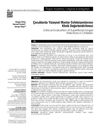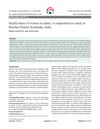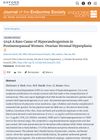 29 citations,
January 2016 in “International Journal of Dermatology”
29 citations,
January 2016 in “International Journal of Dermatology” Longer hair loss leads to more severe CCCA; early treatment and avoiding damaging hairstyles help regrowth.
 14 citations,
January 2018 in “Advances in Clinical Chemistry”
14 citations,
January 2018 in “Advances in Clinical Chemistry” The document concludes that hormonal biomarkers are key for diagnosing hyperandrogenemia in women and hypogonadism in men.
 41 citations,
January 2020 in “Journal of Ovarian Research”
41 citations,
January 2020 in “Journal of Ovarian Research” Quercetin may help with PCOS symptoms, but more research is needed.
 14 citations,
August 2019 in “BioMed Research International”
14 citations,
August 2019 in “BioMed Research International” Belly fat is the main predictor of nonalcoholic fatty liver disease in both women with Polycystic ovary syndrome and healthy women.
 July 2023 in “International Journal of Endocrinology”
July 2023 in “International Journal of Endocrinology” Centratherum anthelminticum seed extract effectively treats Polycystic Ovary Syndrome in rats.
 24 citations,
November 2015 in “Annals of Nutrition and Metabolism”
24 citations,
November 2015 in “Annals of Nutrition and Metabolism” Certain SHBG gene variants, like rs727428, are linked to higher testosterone levels in women with PCOS.
 8 citations,
September 2017 in “The Journal for Nurse Practitioners”
8 citations,
September 2017 in “The Journal for Nurse Practitioners” Most women with PCOS use positive coping strategies, but some with more psychological stress use negative ones.
 December 2015 in “Turk Dermatoloji Dergisi”
December 2015 in “Turk Dermatoloji Dergisi” The study found that scalp ringworm is the most common fungal infection in children and topical treatments work well.
 August 2022 in “IntechOpen eBooks”
August 2022 in “IntechOpen eBooks” Congenital Adrenal Hyperplasia is a rare inherited disease causing hormone imbalances, affecting growth, fertility, and heart health, diagnosed through blood tests and treated with medication and lifestyle changes.
 30 citations,
April 2014 in “Seminars in Reproductive Medicine”
30 citations,
April 2014 in “Seminars in Reproductive Medicine” Diagnosing PCOS in teenagers is hard because its symptoms often look like normal puberty, and there's a need for better diagnosis methods and agreement on criteria.
 2 citations,
September 2021 in “JCPSP. Journal of the College of Physicians & Surgeons Pakistan”
2 citations,
September 2021 in “JCPSP. Journal of the College of Physicians & Surgeons Pakistan” Women with PCOS have thicker parafoveal areas in their retinas, but their macular blood vessel density is normal.
 22 citations,
January 2014 in “Indian Journal of Endocrinology and Metabolism”
22 citations,
January 2014 in “Indian Journal of Endocrinology and Metabolism” Family members of North Indian women with PCOS have a high rate of metabolic syndrome.
 38 citations,
January 2011 in “Endocrine Journal”
38 citations,
January 2011 in “Endocrine Journal” Weight loss and metformin don't significantly change vaspin levels in women with PCOS.
 9 citations,
May 2015 in “Cardiology Clinics”
9 citations,
May 2015 in “Cardiology Clinics” The conclusion is that managing cholesterol is important for women, especially during pregnancy, breastfeeding, and with PCOS, and involves regular screening and careful treatment choices.
4 citations,
August 2018 in “Journal of cellular biochemistry” Acid inside cells speeds up aging and turns on aging signs in mice.
 53 citations,
January 2012 in “Fertility and Sterility”
53 citations,
January 2012 in “Fertility and Sterility” Women with PCOS are more likely to have sleep apnea, mainly if they are obese.
 39 citations,
January 2012 in “Reproductive Biology and Endocrinology”
39 citations,
January 2012 in “Reproductive Biology and Endocrinology” About 8.5% of women in Salvador, Brazil, have Polycystic Ovary Syndrome.
 98 citations,
July 2011 in “Fertility and Sterility”
98 citations,
July 2011 in “Fertility and Sterility” An mFG score of 5 or more indicates above-normal hair growth in Southern Chinese women.
 21 citations,
February 2016 in “Reproductive Biomedicine Online”
21 citations,
February 2016 in “Reproductive Biomedicine Online” The conclusion suggests that PCOS may persist due to genetic traits that, while harmful for female fertility, could have provided survival and reproductive benefits to males.
27 citations,
August 2008 in “Mayo Clinic proceedings” Early recognition and treatment of Peripheral Arterial Disease is crucial to improve survival and health outcomes.
 March 2014 in “Fertility and Sterility”
March 2014 in “Fertility and Sterility” The April 2014 issue of "Fertility and Sterility" discussed various reproductive health topics, including hormone therapy benefits, sperm and genetic factors in male infertility, and the link between PCOS and diabetes.
 July 2022 in “Research Square (Research Square)”
July 2022 in “Research Square (Research Square)” Lower PPARγ levels and specific gene variations are linked to more severe Frontal Fibrosing Alopecia.
 75 citations,
July 2013 in “The Journal of Clinical Endocrinology and Metabolism”
75 citations,
July 2013 in “The Journal of Clinical Endocrinology and Metabolism” Taking low-dose spironolactone and metformin together works better for PCOS symptoms than either drug alone.
 95 citations,
April 2013 in “PLOS ONE”
95 citations,
April 2013 in “PLOS ONE” Ginseng is possibly safe but its effectiveness is unclear due to poor quality studies and mixed results.
31 citations,
November 2020 in “International journal of molecular sciences” Adipokines affect skin health and could be targeted for treating skin diseases.
11 citations,
October 2020 in “Sultan Qaboos University medical journal” Bariatric surgery helps with weight loss but can cause complications and nutritional deficiencies.
 51 citations,
November 2011 in “Reproductive Biology and Endocrinology”
51 citations,
November 2011 in “Reproductive Biology and Endocrinology” About 13% of women had idiopathic hirsutism and 8.5% had polycystic ovary syndrome in a group of Iranian women.
 9 citations,
May 2021 in “Frontiers in Cell and Developmental Biology”
9 citations,
May 2021 in “Frontiers in Cell and Developmental Biology” DNA methylation changes in women with PCOS could be used as disease markers and suggest new treatment targets.
 December 2024 in “THE SCIENTIFIC TEMPER”
December 2024 in “THE SCIENTIFIC TEMPER” Women in Raichur slums need better health awareness and medical help.
 October 2024 in “Journal of the Endocrine Society”
October 2024 in “Journal of the Endocrine Society” Ovarian stromal hyperplasia can cause high testosterone in postmenopausal women and is treated by removing the ovaries.


























